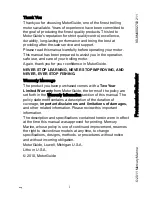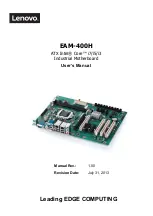
PX925X/PX925XE Series
16
Connectors
Floppy Disk Connector: FDC
These mainboards provide a standard floppy disk connector (FDC) that supports 360K,
720K, 1.2M, 1.44M and 2.88M floppy diskette drives. This connector supports the floppy
drive ribbon cables provided in the packaging.
Hard Disk Connectors: IDE1/ RAID IDE1-2/ SATA1-4
These mainboards provide a standard IDE connector that supports PIO Mode 0~4, Bus
Master, Ultra ATA 66/100. These boards also contain 2 RAID IDE connectors that supports
Ultra ATA 133 transmission rates and RAID 0/1/0+1 and JBOD modes. 4 Serial ATA
connectors are also available and can provide 150 MB/s transmission rates and RAID 0/ 1
modes for the PX925X-R/ PRO-R and PX925XE PRO-R.
IDE1 (Primary IDE Connector)
You can connect 2 IDE devices to the IDE1 connector using a single ribbon cable with 3
connectors (2 for the drives and one to connect to the board). If you are connecting 1
drive, you should configure it as the Master device. If you are connecting a second drive,
you must configure it as the Slave device (see your hard drive manual for master/slave
configuration specifics). If you have an IDE CD-ROM drive, you just can attach it to this
connector.
RAID IDE1/ RAID IDE2 (RAID IDE connectors)
These connectors are capable of sophisticated disk management using RAID 0/1/0+1 and
JBOD modes
(
for more details about RAID IDE configuration, please refer to the ITE
RAID Controller manual
)
.
As with the IDE1 connector, you can connect 2 drives to this
connector. If you are attaching a second drive, the first drive must be configured as the
Master with the second drive being the Slave (see hard drive manual for master/slave
configuration specifics). This connector can be only used with hard disk devices.
RAID 0
(disk striping) Striping is a performance-oriented, non-redundant disk storage
technology. With RAID striping, multiple disks are used to form a larger virtual disk. Data
is then striped or mapped across all the physical disks. In this way disk drives can perform
multiple I/O operations in parallel, enhancing performance.
RAID 1
(disk mirroring) With Disk Mirroring there is a redundant disk that mirrors the
main disk. Data that is written to the main disk is also written to the redundant disk. This
redundancy provides fault tolerant protection from a single disk failure. If a read/write
failure occurs on one drive, the system can still read and write data using the other drive.
RAID 0+1
This mode combines both the performance benefits of RAID 0 with the fault
tolerance of RAID 1
JBOD
(Just a Bunch Of Disks) This mode provides you with a way to combine many hard
drives to create a larger drive. The JBOD drive will operate with the same functionality as
a standard hard drive.
SATA1-4 (Serial ATA connectors)
These SATA connectors support Serial ATA 150 and the PX925X-R/ PX925PRO-R/ PX925XE
PRO-R supports RAID 0/ 1 modes. Each SATA connector can only support one serial ATA
device.
Note
: With most storage devices, there is a power cable that you need attach to a
power source (power supply).
(for more details, please refer to the appendix II.)
Summary of Contents for PX925X Series
Page 9: ...PX925X PX925XE Series 5 Configuration Layout of PX925XE PRO...
Page 10: ...PX925X PX925XE Series 6 Layout of PX925XE PRO R...
Page 11: ...PX925X PX925XE Series 7 Layout of PX925X...
Page 12: ...PX925X PX925XE Series 8 Layout of PX925X R...
Page 13: ...PX925X PX925XE Series 9 Layout of PX925X PRO...
Page 14: ...PX925X PX925XE Series 10 Layout of PX925X PRO R...
















































